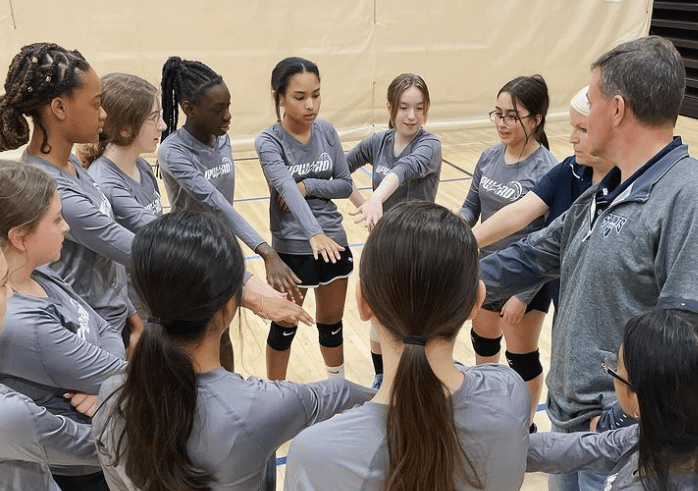By Eddie Becker
Now, more than ever, the church has a tremendous opportunity to make an impact on teenage girls. But with all the different things capturing their attention, how can you find a voice to reach them?
There’s a way to engage tween and teen girls in a fun way that makes a positive difference in their lives: volleyball.
Inviting girls in your community to participate in a volleyball league has numerous benefits.
So, why exactly should your church run a volleyball league aimed at reaching tween and teen girls?
- To Build Their Confidence
In 2018, a study uncovered some disturbing trends among teenage girls. Between ages 8 and 14, girls’ confidence drops 30 percent. Girls are also 18 percent less likely than boys to describe themselves as confident.
It’s important to note the distinction between how girls view confidence vs. how boys view confidence. To boys, confidence is a belief they can achieve anything. For girls, confidence is simply this: being proud of who you are.
When a girl between 4th grade and 8th grade joins a volleyball team, they become part of an environment of fun and encouragement.
Learning together with teammates helps to build confidence. Caring coaches develop young athletes who not only become better volleyball players on the court, but more confident people off the court.
- To Get Them Active
You may know the verses that end 1 Corinthians 6: Don’t you realize that your body is the temple of the Holy Spirit, who lives in you and was given to you by God? You do not belong to yourself, for God bought you with a high price. So, you must honor God with your body.
Paul was referring largely in these verses to sexual sin, but the importance of honoring God with our bodies plays out in how we care for it. This includes eating well and getting regular exercise.
Unfortunately for teenagers, physical exercise is becoming less and less common. Teens spend up to 5 hours or more each day on devices, while only 15 percent of them get the recommended 60 minutes of daily exercise.
Spiritual health is, of course, essential, but why not combine that with physical health? Volleyball creates avenues for young girls to get the exercise they lack, surrounded by helpful coaches teammates rooting each other on.
- To Give Them the Freedom to Fail
We’ve touched on the issue of confidence already, but a key component of that is the fear of failure. Between the ages of 12 and 13, the percentage of girls who say they’re not allowed to fail increases by 150 percent.
Over half of teenage girls feel the pressure to be perfect. Society certainly plays a massive role in telling girls from an early age exactly how they should look, how they should talk, what their interests should be, and how to act. The pressure to live up to expectations plays quite a toll on teenagers.
Volleyball allows young athletes to “fail with confidence.” What does that mean?
They are encouraged to try new things. They’re encouraged to do their best and keep doing it even if it’s not perfect. Girls need room and freedom to mess up and not feel as if they’ve failed someone or let anyone down.
- To Teach Them Biblical Truth
Being involved in youth sports might seem trivial. But when it allows us to form relationships with children and their families that lead to conversations about Jesus, youth sports can be an amazing thing.
Let’s look at what Jesus had to say about inviting children into our lives: Then he put a little child among them.
Taking the child in his arms, he said to them, “Anyone who welcomes a little child like this on my behalf welcomes me, and anyone who welcomes me welcomes not only me but also my Father who sent me.” (Mark 9:36-37, NLT)
Wow! Think about that. When we welcome in a child, it’s just as if we were welcoming our Heavenly Father.
Sports are an amazing vehicle to introduce Jesus to children and their families. By having a captive audience willing to listen, you’ll be able to share the gospel and help children understand that God loves them and has a plan for their life.
- To Offer Them Something Relevant
In certain parts of the country, youth sports saturate the landscape. Baseball diamonds, soccer fields, and basketball gyms can be found all over. What many don’t realize is that volleyball ranks as the #1 or #2 most popular sport for girls in nearly every state.
Despite this reality, not many parks and recreation departments offer volleyball. Starting a volleyball league would draw in people from the community that don’t have anywhere else nearby to play.
If your church has run other leagues in the past, offering volleyball gives young athletes a different sport to try out. Girls who have been playing soccer or basketball for years may jump at the chance to play something new.
- To Help Them Foster Positive Relationships
By the age of 10, most children have their own smartphone (though some studies say the age is closer to 7). Once these young people hit the age of 12, over 50 percent of them will be active on social media. Those stats may worry you, and for good reason.
The relationships many teens experience on social media become at best, shallow and at the worst, toxic. With the pandemic forcing many children to spend more time isolated indoors, relationships with peers become strained or fade away.
People are designed by God to be in community with others. We are all designed to have strong, God-honoring relationships. Being part of a volleyball team allows strong friendships to blossom in healthy ways.
Adults having positive interactions with young athletes can also give a glimpse of the person of Jesus and the love he has for them. All of us, young or old, need community.
Providing a safe, fun, biblical community for tween and teen girls can create a foundation of discipleship that impacts generations.
This article is courtesy of Upward Sports. For over two decades, they have been a partner to churches in leveraging the power of sports to achieve and increase the impact of their mission.
Is your church interested in using sports to reach your community? Upward Sports wants to customize your sports ministry to support your outreach strategy. Learn more at www.Upward.org.













